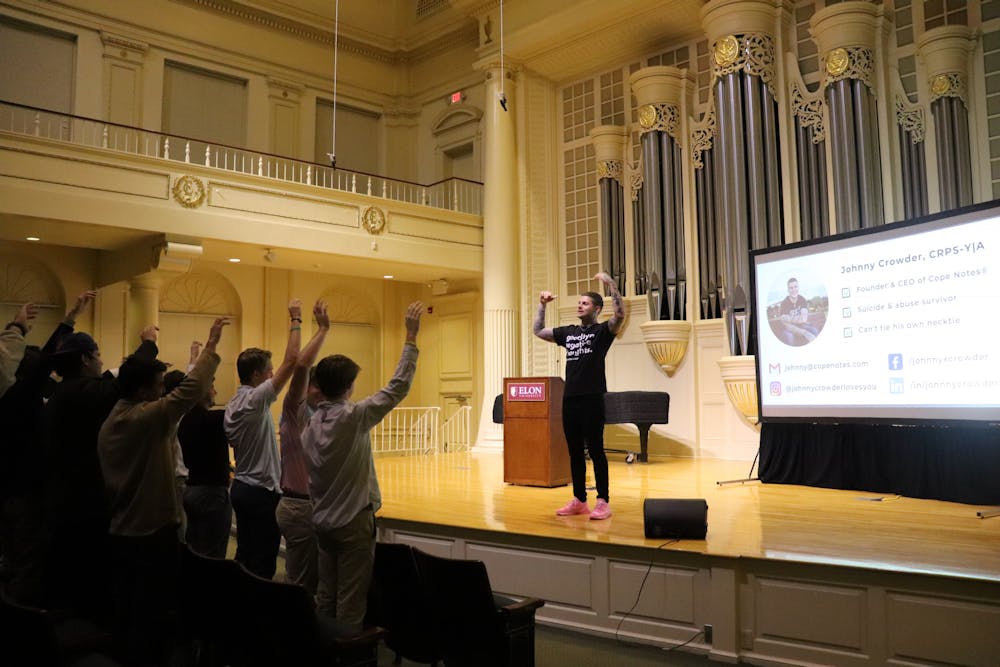Oct. 2 to 8 is National Mental Illness Awareness Week. To kick off events for the week, Elon University’s Beta Theta Pi chapter collaborated with keynote speaker Johnny Crowder to address students on mental health awareness. The first annual Healthy Minds, Healthy Lives forum was held in Whitley Auditorium on Oct. 3 and was open to all students, regardless of gender identity.
Crowder is a mental health advocate and the founder and CEO of Cope Notes, an online mental health support system. His previous TED talks on his experience with depression and suicidal ideation have garnered hundreds of thousands of views.
Prior to Crowder’s address, SPARKS Peer Educators, campus counseling and Active Minds organization tables were set up outside the Whitley Auditorium to provide resources and other materials to students.
“In general, events like this are so refreshing,” said Active Minds’ public relation chair Sophie Blumenfeld. “If people are only relying on social media, information could either be completely inaccurate or may even make people feel more alone, and that’s why it’s so important to hold community events on campus.”
Students stopped by to grab resource pamphlets and begin conversations on destigmatizing mental illness before the gathering in the auditorium.
Crowder began his speech by sharing his connection to mental health diagnoses and his process of navigating recovery and support.
“I am the statistic,” he said, opening the address.
He broke down the number of people living with mental health issues today and explained why he believes conversations surrounding these issues are still so stigmatized.
“There are people in this room right now that know they’ve been feeling depressed, they’ve been feeling anxious, and they haven’t done anything about it for months — for fear of someone judging you or for fear of what you might discover about yourself,” Crowder said.
Throughout the presentation, Crowder interacted with the crowd in the hope of creating a sense of community and participation.
In one connection piece in particular, Crowder asked the crowd to pair up with individuals around them and share something that had been dragging them down mentally. The audience was given 30 seconds to let something off their chest before emphasizing the importance of the activity they had just performed, which was the ability to open up.
Elon sophomore Clay Burns was one of many in the crowd.
“When he got everyone to talk with each other, I think that was really important. I said something to the person next to me who I've only ever said to my girlfriend,” Burns said.
Following the narration of his own personal strategies, such as daily journaling, Crowder gave advice on how to take steps to destigmatize support and conversation.
“We need to focus on one small thing we can do now to start us off for success,” Crowder said. “It becomes really easy to think about starting a new medication or going to therapy. Honestly, the way we smash the stigma and erase the thing silently keeping us from knowing each other is talking about it.”
Woven throughout the event was Crowder’s message of reframing one’s approach to appreciating life and the importance of using small tools to make big impacts in one’s own mental health and also those around them. This message resonated with Burns.
“Taking solace within oneself and being proud of how far you’ve come is what resonates with me now,” Burns said. “He changed my perspective, and I'm glad I could connect to my community here.”


